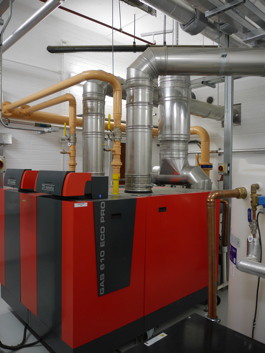Raising the bar for boiler systems

The efficiency of heating systems can benefit enormously with the use of advanced condensing boilers and appropriate control, as Chris Meir of Remeha explains.
Finding ways to reduce energy consumption has been a major driver for organisations in recent years as they seek to cut energy bills and lower their carbon footprint. But in today’s uncertain times, energy efficiency is more important than ever — a cost-effective, win-win solution to protecting energy security, achieving sustainability targets and keeping energy costs down.
The potential savings from implementing energy-efficiency measures are considerable. The Carbon Trust estimates that smaller organisations could shave 20 to 30% off their fuel bills simply by replacing old, energy-guzzling equipment with energy-efficient models. The European Union predicts a similar 20% reduction for refurbishment projects where older equipment is replaced with products compliant with the tighter energy efficiency standards of the Ecodesign of Energy-related Products Directive (ErP).
So how to go about identifying energy efficiency improvements in our existing non-domestic building stock?
Heating is a large user of energy in a building, accounting for about 40% of UK energy consumption and 20% of UK greenhouse gas emissions (Committee on Climate Change 2016). As such it is a commonly recommended starting point for efficiency measures. And for the many buildings relying on commercial boilers for their heating, a simple boiler upgrade scores high on the list of acknowledged quick wins for improved heating efficiency.
In terms of improved efficiency, the figures speak for themselves. A 10 to 15 year old boiler will achieve 70% gross efficiency at best, even when well maintained. In contrast, the latest condensing boilers are capable of delivering around 97% gross seasonal efficiency. That’s 10 to 12% higher than non-condensing boilers.
The challenge can be to achieve these high efficiencies when retrofitting condensing boilers onto older systems. Condensing boilers work most effectively at lower return temperatures of up to 54°C (dewpoint) where they can recover both sensible and latent heat from the flue gases.
However, in older buildings, the radiator circuits will typically have been designed for 82/71°C flow /return temperatures, which prevent the boiler condensing.
Lowering the flow/return temperatures to 70/50°C or even 60/40°C is one solution to increased efficiency gains. Another is to address the temperature differential.
The selection of secondary flow and return temperatures (the ∆T) has a major impact on the how the system as a whole will perform. Widening the differential to, say, 80/50°C will enable the condensing boilers to condense. At the same time, it will ensure that they provide the required higher-temperature water to heat a calorifier or plate heat exchanger.
Designing on a wider ∆T also helps future-proof the system as it will enable the addition of renewable and CHP technology for further energy and carbon savings at a later date. Widening the temperature differential, as recommended in CIBSE’s ‘Heat networks: code of practice for the UK’, will allow all the components to operate at optimum efficiency.

The next consideration is how best to meet the heat-output demand. With manufacturers providing increasingly flexible design options, consultants have a greater choice from which to select the most appropriate solution for each application. Increasingly, however, the trend is to share the load across multiple fully-modulating boilers in modular configuration rather than install a single larger output unit.
By sharing the load, the boilers can operate at part load where they achieve their higher efficiencies. At the same time, installing multiple condensing boilers increases the turndown ratio and improves the modulation capability. This enables the boilers to match the building’s flexible heat demand more closely for more energy-saving operation.
A multi-boiler configuration brings numerous benefits, making the heating provision more reliable and secure, reducing downtime, and simplifying maintenance and service. It also increases the lifecycle of the products. Given that 80% of the lifetime costs of a building are operational, this is an important commercial consideration.
Quick fixes should also deliver faster, easier installation solutions to remove the perceived ‘hassle factor’ that can be a deterrent to implementing heating efficiency improvements. Here again, condensing boilers score high.
Manufacturers like Remeha provide comprehensive preconfigured cascade packages for two to eight wall-hung and now floor-standing condensing boilers. The ultra-compact dimensions of the Remeha boilers, combined with the smart gas and water connection technology of the cascade system, make it possible to install a high heat output in an impressively small footprint. This rapid, flexible installation solution reduces on-site labour, skills, hot works and time. And time is money.
Adding the appropriate controls is key to achieving the higher heating efficiencies. Upgrading from simple on/off controls to time and temperature controls will enable the boilers to perform more efficiently. Adding advanced weather compensated control further increases the savings by helping the boilers to adapt to the fluctuating demand according to outside temperature. On a cascade system, sequential control ensures that the boilers operate effectively and reliably, rotating the lead boiler and lengthening the serviceable life.
In condensing boilers we have a simple, cost-effective, quick-fix to improved heating efficiency.
In a well-designed, well-sized and well-controlled system, condensing boilers help deliver a more comfortable, productive building environment, lower energy costs and a reduced carbon footprint. With a relatively low initial capital cost and rapid return on investment, investing in this technology can contribute to a better bottom line. In these times of uncertainty, it’s good to know that when energy-efficient heating is required, condensing boilers deliver on all levels.
Chris Meir is sales director at Remeha.







